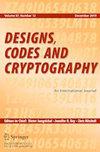MUB 三胞胎族中出现的复哈达玛矩阵的特征描述
IF 1.4
2区 数学
Q3 COMPUTER SCIENCE, THEORY & METHODS
引用次数: 0
摘要
研究表明,阶数为 6 的归一化复哈达玛矩阵有三个不同的列,每个列至少包含一个 \(-1\) 条目,它必然属于转置傅里叶族或 2 循环复哈达玛矩阵族。证明依赖于用格罗布纳基础技术求解多项式方程组,并利用了关于正则哈达玛矩阵的结构定理。因此,在实践中可以很容易地识别这两个族的成员。特别是,我们可以识别出现在已知的维数为 6 的成对互不偏倚基三元组中的复哈达玛矩阵。本文章由计算机程序翻译,如有差异,请以英文原文为准。
A characterization of complex Hadamard matrices appearing in families of MUB triplets
It is shown that a normalized complex Hadamard matrix of order 6 having three distinct columns each containing at least one \(-1\) entry, necessarily belongs to the transposed Fourier family, or to the family of 2-circulant complex Hadamard matrices. The proofs rely on solving polynomial systems of equations by Gröbner basis techniques, and make use of a structure theorem concerning regular Hadamard matrices. As a consequence, members of these two families can be easily recognized in practice. In particular, one can identify complex Hadamard matrices appearing in known triplets of pairwise mutually unbiased bases in dimension 6.
求助全文
通过发布文献求助,成功后即可免费获取论文全文。
去求助
来源期刊

Designs, Codes and Cryptography
工程技术-计算机:理论方法
CiteScore
2.80
自引率
12.50%
发文量
157
审稿时长
16.5 months
期刊介绍:
Designs, Codes and Cryptography is an archival peer-reviewed technical journal publishing original research papers in the designated areas. There is a great deal of activity in design theory, coding theory and cryptography, including a substantial amount of research which brings together more than one of the subjects. While many journals exist for each of the individual areas, few encourage the interaction of the disciplines.
The journal was founded to meet the needs of mathematicians, engineers and computer scientists working in these areas, whose interests extend beyond the bounds of any one of the individual disciplines. The journal provides a forum for high quality research in its three areas, with papers touching more than one of the areas especially welcome.
The journal also considers high quality submissions in the closely related areas of finite fields and finite geometries, which provide important tools for both the construction and the actual application of designs, codes and cryptographic systems. In particular, it includes (mostly theoretical) papers on computational aspects of finite fields. It also considers topics in sequence design, which frequently admit equivalent formulations in the journal’s main areas.
Designs, Codes and Cryptography is mathematically oriented, emphasizing the algebraic and geometric aspects of the areas it covers. The journal considers high quality papers of both a theoretical and a practical nature, provided they contain a substantial amount of mathematics.
 求助内容:
求助内容: 应助结果提醒方式:
应助结果提醒方式:


